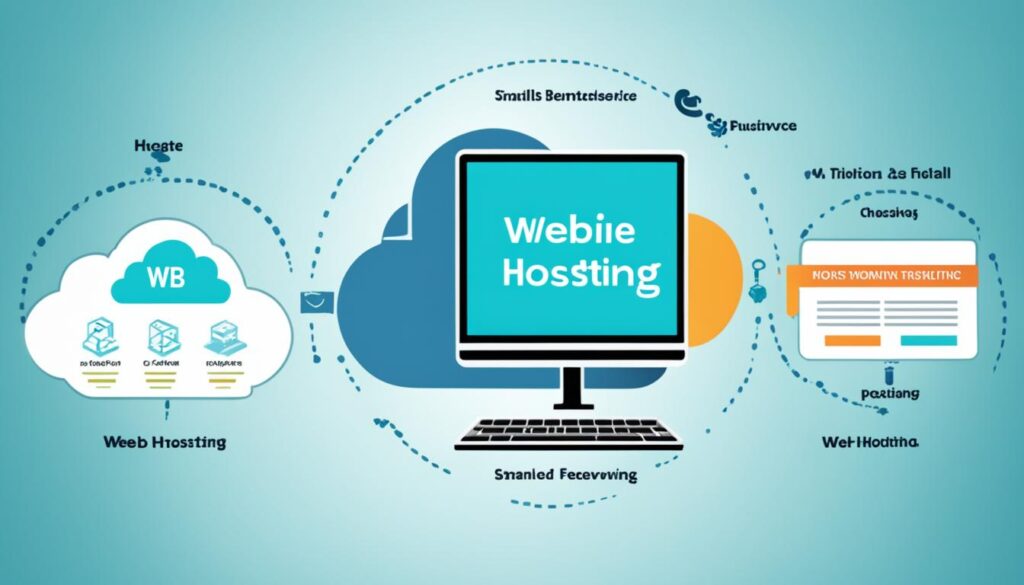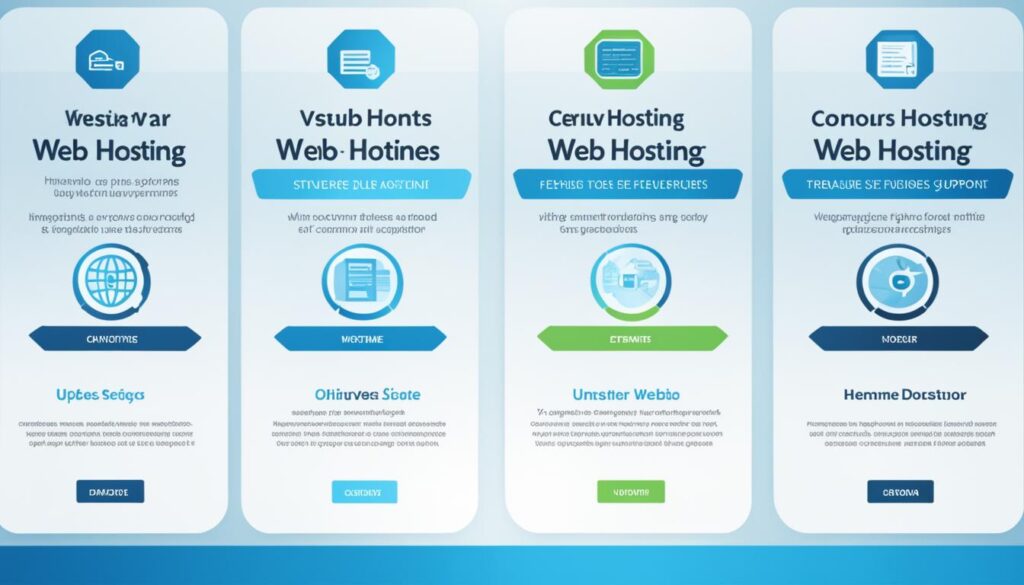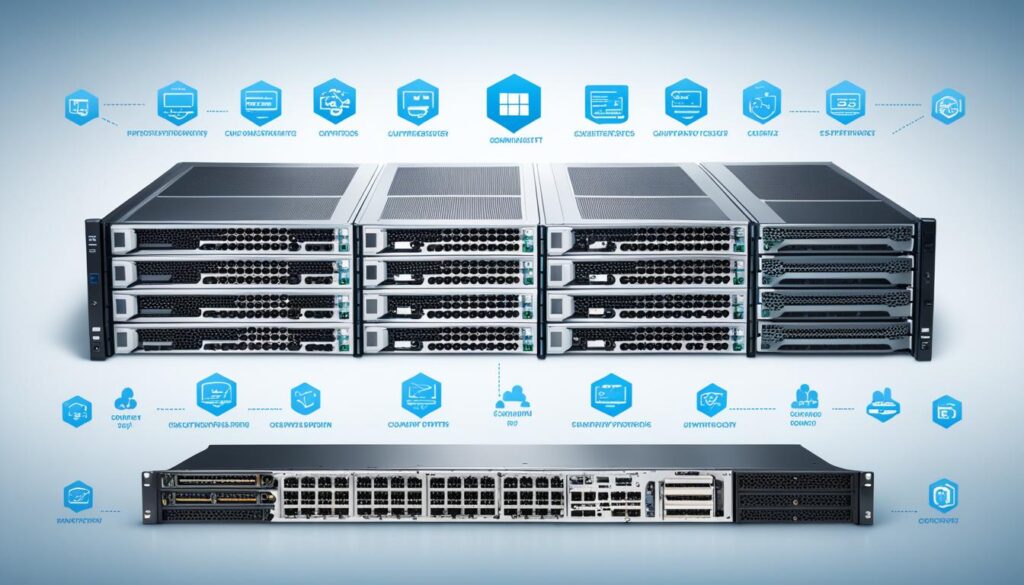Finding the right web hosting can be tough. There are so many choices out there. But we’re here to help you. This guide will show you how to pick the best web hosting. It should meet your specific needs.

Key Takeaways:
- Understanding your web hosting needs is crucial in selecting the right provider.
- Research and compare different web hosting providers to find a reliable and reputable company.
- Consider key features such as bandwidth, storage, and customer service when making your decision.
- Test the customer support and backup plans of your chosen web host to ensure efficient assistance and data recovery.
- Focus on security features to protect your website and customer data.
What is Web Hosting?
Web hosting is an essential service that makes websites available on the internet. It securely stores website files on a server. These files include coding, images, videos, and text, crucial for a website’s operation and look.
A user types a website’s domain name into their browser to visit it. The server quickly pulls up the necessary files. This lets the visitor see the website and explore its pages and features.
Web hosting providers also offer other services to improve websites. They help with setup, maintenance, and solving problems. Some even provide tools for building websites, managing content, and email services.
There are many web hosting providers, like WPEngine, Bluehost, and GoDaddy. They have various plans and features for different website needs. Picking the best web hosting service is key for a website’s reliability, security, and speed.
“Web hosting is like renting space on the internet to store and display your website. It supports your online presence and is vital for your website’s success.”
Types of Web Hosting
| Hosting Type | Description | Pros | Cons |
|---|---|---|---|
| Shared Hosting | A hosting option where multiple websites share resources on a single server. | – Low cost – Easy to set up and manage – Suitable for small websites and beginners |
– Limited resources – Possible performance issues if other websites on the server experience high traffic |
| VPS Hosting | A virtual private server that allows sharing a physical server with separate virtual instances. | – More resources and control than shared hosting – Scalable and customizable – Enhanced performance |
– Higher cost compared to shared hosting – Requires technical knowledge for setup and management |
| Dedicated Hosting | A hosting option where a website has exclusive use of an entire physical server. | – Full control and resources – High performance and security – Suitable for large websites with high traffic |
– Higher cost compared to shared and VPS hosting – Requires technical knowledge for setup and management |
| Cloud Hosting | Website files are stored on multiple servers, providing scalability and reliability. | – Scalable resources based on website demands – High reliability and uptime – Pay-only-for-what-you-use pricing model |
– Can be more complex to set up and manage – Higher cost for high-traffic websites |
| Managed WordPress Hosting | Specifically designed for WordPress websites with optimized performance and security features. | – Built-in WordPress optimization and security – Automatic updates and backups – Technical support with WordPress expertise |
– Limited flexibility and control compared to other hosting types – Higher cost for specialized WordPress features |
| Reseller Hosting | A hosting package that allows individuals to resell hosting services to their clients. | – Additional revenue streams – Ability to offer personalized hosting packages – Support from the parent hosting company |
– Requires managing customer accounts and support – Higher cost compared to shared hosting |
Determine Your Web Hosting Needs
Choosing the right web hosting provider requires knowing your needs well. Think about your website type, expected traffic, and necessary resources. This helps in picking the hosting that fits your requirements best.
Shared hosting: Great for small sites and beginners, shared hosting lets many websites use one server. This makes it cost-effective. But, if other sites use too much resource, your site may slow down.
VPS hosting: Virtual Private Server (VPS) hosting gives you more control and dedicated resources. It’s better for sites that are growing and see a lot of visitors. It’s more reliable than shared hosting.
Dedicated hosting: With dedicated hosting, you get a server all to yourself. It’s top-notch for security, performance, and customizing. Large businesses or sites with lots of visitors and heavy applications need this.
Cloud hosting: Cloud hosting uses many servers for better uptime and flexibility. It’s great for sites with changing traffic or those expecting to grow quickly. It evenly spreads out resources.
Think about what your website needs and your future plans. Choosing the right type of web host matters. It ensures your site performs well and gives visitors a great experience.

“Selecting the right web hosting provider is like choosing the foundation for your digital presence. Understanding your web hosting needs is the first step towards building a reliable and scalable website.”
Research and Compare Web Hosting Providers
Finding a reliable web hosting company is key for your website’s success. It’s vital to research and compare to make a good choice. Here are important steps to follow:
Read Reviews and Testimonials
Look for reviews and testimonials on trusted sites. They give insights into various web hosting providers’ reliability. Customer feedback is especially helpful for understanding their experiences.
“After reading numerous web hosting reviews, I found that many users praised XYZ Hosting for their excellent customer support and reliable service.” – John Smith, blogger
Compare Pricing and Features
Comparing pricing and features is a must. Think about your website’s needs and resources required. Aim for plans that blend affordability with functionality.
Look at these pricing plans for popular web hosts:
| Web Hosting Provider | Pricing | Features |
|---|---|---|
| HostGator | $2.75/mo | Unlimited bandwidth, free SSL, 24/7 customer support |
| DreamHost | $2.59/mo | Unlimited traffic, free domain, 97-day money-back guarantee |
| InMotion Hosting | $6.99/mo | Unlimited disk space, free website migration, 24/7 support |
Consider Reliability and Customer Support
Having a reliable web host keeps your site online. Look for hosts with solid servers and little downtime. Also, good customer support is crucial. They should be quick to help with any issues.
“A web host with 24/7 customer support was a big win for my business. It lets me get help whenever needed.” – Jane Williams, small business owner
Keep an Eye on Customer Complaints
Be aware of customer complaints while researching. Recurring issues or negative feedback can be red flags. Online forums are great for real user insights.
Web Host Comparison Infographic

Researching and comparing web hosting providers is key. Look at reviews, pricing, reliability, customer support, and complaints. This way, you’ll pick the best host for your needs. It leads to a better hosting experience and website success.
Consider Key Features of Web Hosting
When looking for web hosting, several key features are important. These ensure you get the best hosting experience.
Bandwidth and Storage:
Bandwidth is about how much data can move from your site to visitors. Storage means how much space you have for files like images and videos. Make sure your plan has enough bandwidth and storage for your site’s needs. Think about your website’s traffic and file sizes.
Server Speed:
Server speed is key for a good website. A fast website makes users happy and they stay longer. Choose a host with high-quality servers and known for speed. This ensures your website performs its best.
Customer Service:
Good customer service is a must for web hosting. It helps when you have technical issues or questions. Choose a provider with many support options like live chat, email, and phone. They should be known for great service.
Terms of Service and Refund Policy:
It’s important to understand a web host’s terms of service. Check their cancellation policies and billing cycles. Plus, a clear refund policy is always a good thing. It gives you peace of mind.
Uptime Guarantee:
The uptime guarantee shows how often your site will be online. Aim for a host offering 99.9% uptime or higher. This makes sure your site is always available to visitors. A reliable host will have good systems to reduce downtime.
Keeping these key features in mind helps you choose the right web hosting provider. This choice impacts your website’s bandwidth, storage, speed, service, and reliability.

| Features | Bandwidth | Storage | Server Speed | Customer Service | Terms of Service | Refund Policy | Uptime Guarantee |
|---|---|---|---|---|---|---|---|
| Provider A | Unlimited | 100GB | Fast | 24/7 | Favorable | Flexible | 99.9% |
| Provider B | 500GB | 500GB | Medium | Business Hours | Standard | 30-day Money-Back | 99.8% |
| Provider C | Unlimited | 50GB | Fast | 24/7 | Favorable | No Refunds | 99.9% |
Test Customer Support and Backup Plans
When looking for a web host, testing their customer support is key. You should also ask about their backup plans. Good customer support is crucial for a great web hosting experience. It ensures you get fast, effective help when needed.
Response Time
How fast a web host replies is very important. You need a provider that quickly answers your support requests or questions. Quick responses help fix any issues fast. This way, your website faces less downtime and fewer disruptions.
Support Channels
Web hosts offer support through live chat, email, and phone. It’s important to check how well these channels work. Choose a provider that supports you 24/7 through these channels. This helps with any tech or account issues anytime.
Backup Plans
Checking a web host’s backup plans is also critical. Accidents can lead to data loss, which can be very harmful. Ask how often and how they back up your website data. Regular backups mean your website can be quickly restored if something goes wrong.
By thoroughly testing customer support and backup plans, you get a web hosting service that’s reliable. This service protects your website data and reduces downtime.
Choosing a web host with top-notch customer support and strong backup plans is like having a safety net for your website. It brings peace of mind, keeping your site safe and available at all times.

| Key Factors | Customer Support Importance | Backup Plans Importance |
|---|---|---|
| Response Time | High | Medium |
| Support Channels | High | Low |
| Backup Plans | Medium | High |
Focus on Security Features
Security is key when picking a web host. It’s crucial to choose one dedicated to web hosting security. This includes SSL certificates, secure transactions, and protecting customer data on secure servers. Doing so protects your site and earns your customers’ trust.
SSL Certificates for Secure Transactions
SSL certificates are essential for security in hosting. They make the data shared between your site and visitors safe. When choosing a web host, ensure they offer SSL certificates. This keeps sensitive info like credit card numbers safe.
Customer Data Protection
Protecting customer data is critical in our digital world. Pick a hosting provider with strong measures to keep customer data safe. They should have secure storage, regular backups, and strict access rules. This keeps customer info private and builds trust in your site.
Secure Servers and Data Breach Prevention
Secure servers are the base of web hosting security. Your host should use secure server tech. This includes firewalls and regular security checks. It helps stop data breaches and unauthorized access to your site.

Focus on security, including SSL certificates and secure transactions. Ensuring customer data protection and using secure servers is vital. Choose a host that makes security a priority. This protects your site and keeps sensitive info safe.
Understand the Importance of Choosing the Right Web Hosting Service
Choosing the right web hosting service is key to your website’s success. Your web host affects your website’s speed, availability, and safety. These factors influence how much your visitors trust your site, its online rank, and its overall success.
Website Performance:
Web hosting directly affects your site’s speed. A good host means your site loads quickly, responds fast, and is easy to navigate. A slow site can make visitors leave and decrease their happiness, hurting your online presence.
Website Uptime:
Uptime is how often your site is up and running. A solid web host ensures your site is always available. This is necessary for a good user experience and to stop you from losing potential earnings.
Website Security:
Security is crucial in web hosting. A top web host will protect your site from online dangers like malware and data theft. This keeps your site and user data safe, earning your visitors’ trust.
Customer Trust:
The right web host boosts customer trust. A site that’s safe, reliable, and fast shows users they can trust it. This trust is vital for lasting relationships, repeat visits, and more conversions.
Website Ranking:
A good web hosting affects your site’s search ranking. Search engines favor fast, always available sites. Choosing a top-notch web host can help your site rank higher and be seen by more people.
Making a smart choice in web hosting is crucial. Focus on speed, uptime, safety, trust, and ranking for success online. This ensures you meet your site’s goals and grow your presence on the web.
Source:
Best Web Hosting Companies
Choosing the right web hosting company is key. There are several leading companies known for their exceptional services. Among them are HostGator, DreamHost, InMotion Hosting, A2 Hosting, and WPEngine.
These companies are reliable and meet the various needs of website owners. They offer different hosting plans. These plans provide solid performance, flexible pricing, and great support.
HostGator is liked for its ease of use and affordable plans. DreamHost is committed to open-source tech and offers a 100% uptime guarantee. InMotion Hosting focuses on businesses, with top security and the ability to grow.
A2 Hosting is known for speedy hosting thanks to its Turbo servers. This results in web pages loading much faster. WPEngine offers managed WordPress hosting, creating a secure and optimized setting for WordPress sites.
Comparison of Top Web Hosting Companies
Below is a comparison of the main features of these leading web hosting companies:
| Web Hosting Company | Key Features | Pricing | Customer Support |
|---|---|---|---|
| HostGator | Unlimited bandwidth, free website builder, 24/7 customer support | Starting from $2.75 per month | 24/7 live chat, phone, and email support |
| DreamHost | 100% uptime guarantee, free SSL certificate, unlimited storage | Starting from $2.59 per month | 24/7 live chat and email support |
| InMotion Hosting | Unlimited disk space, free domain, advanced security features | Starting from $2.49 per month | 24/7 live chat, phone, and email support |
| A2 Hosting | 20x faster page loading, free site migration, developer-friendly environment | Starting from $2.99 per month | 24/7 live chat, phone, and email support |
| WPEngine | Managed WordPress hosting, automatic backups, advanced security | Starting from $22.50 per month | 24/7 live chat and phone support |
The best web hosting company for you depends on your needs. Think about performance, prices, support, and features. Take the time to compare and find the perfect match for your goals.
Types of Web Hosting
Web hosting comes in many types. Each type has its benefits and features. Knowing these options helps you pick the best one for your site. Let’s take a closer look at them:
1. Shared Hosting
Shared hosting is great for small sites and beginners. Many websites share one server and its resources. It is low-cost and easy to use but may be limited in scalability and speed.
2. VPS Hosting (Virtual Private Server)
VPS hosting is a middle ground between shared and dedicated hosting. It offers virtual servers for better performance and control. VPS is best for sites with moderate traffic.
3. Dedicated Hosting
With dedicated hosting, your site has its own server. This gives top performance, security, and control. It’s meant for big businesses or websites needing lots of power.
4. Cloud Hosting
Cloud hosting uses connected servers for hosting. It allows for easy adjustment of resources based on need. It is good for sites with changing traffic.
5. Managed WordPress Hosting
Managed WordPress hosting is tailor-made for WordPress sites. It boosts speed, updates automatically, enhances security, and offers WordPress help. It helps your site run well so you can grow your business.
6. Reseller Hosting
Reseller hosting lets you sell hosting to others. It gives you tools to manage client sites. It’s great for designers, developers, and agencies adding hosting to their services.
Finding the right web hosting is key for your website’s success. Think about your site’s needs, like traffic and resources, before choosing. Now that you know the hosting types, you can pick one that fits your site’s goals.

Conclusion
Choosing a good web hosting provider is key to your website’s success. Think about what your website needs. This means looking at performance, security, and how much it can grow. This guide has given you tips to find the best hosting plan.
It’s important to look at different web hosting providers. Check their bandwidth, storage, speed, and customer support. Always test how quickly they help you and their backup plans. This ensures you’re ready for any problems.
With the perfect web hosting, your website will be secure and reliable. Making your website fast and safe builds trust with your visitors. It also improves your spot in search rankings and helps you reach your goals online. Use this guide to start your web hosting journey confidently!
